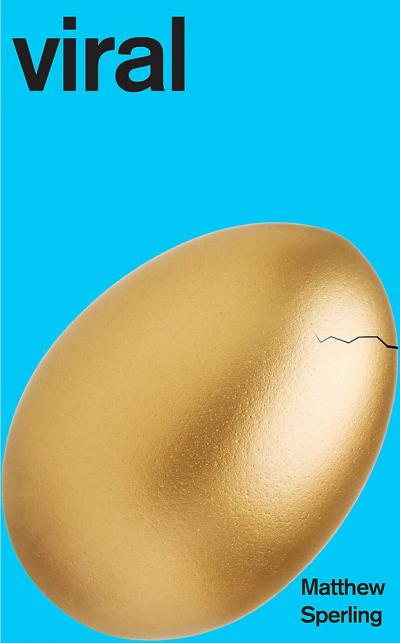Strange, that novels like this, which seem to have their finger on the pulse of the zeitgeist, already have a tinge of sepia about them. Set in a bustling east Berlin, this sharply plotted tale of start-up bliss and blunder, then bliss again, sees characters commuting on public transport, working in an office, attending first-thing-in-the-morning “hype sessions” to run-of-the-mill meetings, bouncing in and out of bar-cafes, going on dates in restaurants, jetsetting on same-day return flights, and schmoozing potential clients and buyers at soirees buoyed by champagne, canapes (the least “safe” of foods) and mask-less face-to-face conversation. All in all, a nostalgia trip.
Such is Sperling's second novel, which takes place in the couple of years before 2016: the era of high-gloss liberalism when Obama was in his second term, Miliband was still a prospect for the premiership (not the man for the job, but a measure of where we were), some places were still ripe for gentrification and one could label “anti-capitalism” a “vibe” with “strong branding potential” without a hint of irony, shame or guilt. The perfect environment, then, for the new Thing Factory, based in the expat haven of the city's hip Kreuzberg district. A joint venture between two thirty-somethings: successful scammer Ned and retired actress Alice (his ex), both fresh from the pages of Matthew Sperling’s London-set debut Astroturf.
 Viral comes like the main course after that testosterone-fuelled starter. We follow the burgeoning company and its cosmopolitan band of ultra-positive employees (creative director Tristan is an accurate portrait of the obliviously and troublingly peppy) as they slip from highly targeted social media PR and marketing into the slightly less salubrious business of sex work, creating an app called Gliss: an “Uber for Escorts”. One episode, a focus group with a selected trio of sex workers, briefly highlights cool Berlin’s natural opposition to all things big tech – a symptom of that aforementioned anti-capitalist vibe – and the app predictably rubs an underground kingpin up the wrong way. More concerning, are the sorts of prejudices and reservations and ethics that make up this new breakneck-speed business of tech. Or, more accurately, the lack thereof: an “Uber for the homeless” is initially suggested.
Viral comes like the main course after that testosterone-fuelled starter. We follow the burgeoning company and its cosmopolitan band of ultra-positive employees (creative director Tristan is an accurate portrait of the obliviously and troublingly peppy) as they slip from highly targeted social media PR and marketing into the slightly less salubrious business of sex work, creating an app called Gliss: an “Uber for Escorts”. One episode, a focus group with a selected trio of sex workers, briefly highlights cool Berlin’s natural opposition to all things big tech – a symptom of that aforementioned anti-capitalist vibe – and the app predictably rubs an underground kingpin up the wrong way. More concerning, are the sorts of prejudices and reservations and ethics that make up this new breakneck-speed business of tech. Or, more accurately, the lack thereof: an “Uber for the homeless” is initially suggested.
For all their tech savvy and climbing wealth, these characters, in matters both personal and professional, seem to have no coherent code of conduct to which to appeal, no values, in fact. Any objections on moral grounds, either in the boardroom or the bedroom – the thoughtful Richard eloquently opposes the app; Tristan has misgivings about talking dirty – are quickly overridden by rhetoric or action. These tactics are mainly employed by the bosses who seem to turn them on themselves when left to their own devices. Alice justifies her more questionable actions by recalling selected highlights from her therapist in LA. Ned hardly feels the need to justify his much more questionable actions at all. As he concludes with almost too much self-awareness, “introspection told one very little”.
Ned could be a stand-in for the author. Taking its cue from him, the narration doesn’t go in for scrutiny. Sperling is not a writer afraid of repeating “she said”. Indeed (a word lampooned in the book), he largely lets his characters speak for themselves, allowing dialogue to run into monologue in the surrounding paragraphs, until they bump into confusion and contradiction. We watch as they try to bridge the gap between action and justification, or erect great walls of morality, only to knock them down. It chimes with Alice’s observation about the people openly swigging beer under the no-alcohol signs on the U-Bahn: “It seemed very Berlin, making so many rules in order that everybody could break them.”
Sperling leaves any judgement up to us, but the lack of ethical consideration or fellow feeling becomes its own sort of criticism for these seeming paragons of Silicon Valley (or Silicon Allee) success. When things go their way, even they are unsure of whether they deserve the payoff – whether they earned it, whether it was worth it, whether it was worth anything at all – before batting the idea away. Sperling goes a long way to throw a wild event or two in their path that might rip up their carefully laid plans, and certainly Viral takes a more unpredictable route than his debut. The clever plotting waylays him, though, from one of the things that helped to enliven that first book: an inventiveness with language.
Despite its smaller cast of characters, Astroturf – thanks in large part to Ned’s creation of a troupe of digital “sock puppets” to simulate and stimulate lively debate of an online forum – had a greater diversity of tone and voice, and sharper awareness of the types and roles people play in public and in private, than this follow-up. Viral traffics in pidgin German, broken English and random accents that sometime standup comedian Tristan puts on, but there’s more emphasis here on what people are saying, rather than how they are saying it, which doesn’t feel like the best exchange.
You don’t need to have read the first novel to feel the lack. One of the funniest and most incisive moments involves Tristan and Alice giving an update to a new social-media client, which sees them indulging in the sort of marketing-speak verbiage so rife that the philosopher Harry G. Frankfurt was moved to theorise it in On Bullshit. The send-up stands out, partly for its loneliness. Perhaps its only rival is the cutthroat high-powered patter of the M&A advisor David Singh. It might take the right kind of audience to enjoy this sort of thing, and admittedly, some of the caricatures and imitations in Astroturf were close to the bone, but surely that’s what satire does, or should do (not to get moralistic about it). It makes for a more entertaining ride than the thriller-ish elements of the book.
Something about Viral suggests this won’t be the last instalment in Ned’s Progress. Maybe Sperling will take more risks with the next book (the threequel?), combining his talents as a plot-twister and precise polygraph of the jumpy rhythms, haphazard grammar and curious constructions of everyday speech which is the circuitry of our current age of anxiety. He would be following in the footsteps of Ned, our modern-day Barry Lyndon-cum-Tom Ripley, who, in another moment of preternatural clarity, thinks “the important thing”, no matter your “blunders and excesses”, is that you “got away with it”. And what is good writing – good art – but smuggling and trespassing and transgressing, and getting away with it?
- Viral by Matthew Sperling (riverrun, £14.99)
- More book reviews on theartsdesk















Add comment